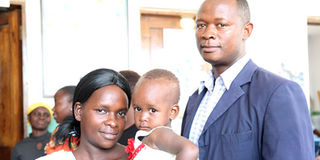Unlocking the healthy-side of contraception

Agnetha and Asnbert with their child. The couple made a joint decision to get advice on family planning. PHOTO|COURTESY
What you need to know:
- With over 30 years of experience working in Tanzanian’s health sector, Ms Zuwaina, a midwife, is not deterred in her endeavours to make women appreciate how family planning could promote women’s health and possibly lift the entire country out of poverty.
There are apparent success stories driven by the family planning campaign in Tanzania but cases of women raising more than 5 children—amidst poverty—leaves a lot to be desired in the country’s quest to empower people and make families healthier.
With over 30 years of experience working in Tanzanian’s health sector, Ms Zuwaina, a midwife, is not deterred in her endeavours to make women appreciate how family planning could promote women’s health and possibly lift the entire country out of poverty.
She says, “Family planning helps women to take care of their children so that they grow up healthy, and it gives women time to work and do other duties in their respective community”.
Zuwaina works to educate women in an effort to break down misconceptions around family planning and the use of contraception.
She recalls the situation in the past and compares it with the currents state of family planning, saying, “Before, a woman would go on having up to 12 or 13 children, now because of family planning she will stop at seven or eight.”
Is contraception still a taboo?
Zuwaina goes on to describe incidences where she has provided a contraception method to a woman, like an implant or an IUD (Intrauterine device), and then later she discovers that the husband is angry about it—insisting it be removed because he thinks his wife will become sterile or sick.
“Quite often women practice family planning in secrecy, without involving their men, because most of the men are against contraception. They think it adds to the women’s health problems,’’ she reveals.
But this is not the case for a section of women, such as Agnetha, 38. She says, “I want to be a successful person – for myself and for my family. I don’t want life difficulties.”
The mother-of-three is a tailor. She also runs a small shop in town to support the family.
Her husband, Ansbert, 37, is a photographer and cameraman who covers weddings and events.
They made a joint decision to get advice on family planning because they want to care for their children and save money to move into their own house.
“We feel we have the number of children we want. We plan to have four children but we won’t have another for a long time. We have money issues and we need to wait,” she says.
Ahead of this year’s London Summit on Family planning, reports show that for the first time in history, 300 million women and girls across 69 of the world’s poorest countries are now using modern contraceptives.
However, there is the unmet need, with current data showing that 60 per cent of adolescent girls (aged 15-19) [married or unmarried and sexually active] in developing countries have an unmet need for modern contraceptives.
This happens at a time when there is a high demand for family planning, and 22 per cent of married women who wish to use family planning but currently do not have access (unmet-need).
Efforts
Development partners are giving an impetus to the family planning efforts. UKAid through the Department for International Development is supporting (£22m; 2014-2018) the Family Planning Outreach programme which is implemented by Population Services International (PSI) and Marie Stopes International (MSI) nationwide.
In line with the government of Tanzania’s Health Sector Strategic Plan, Sharpened One Plan and One Plan II, the programme aims to provide rural women and girls with reliable access to a range of effective family planning services, with an emphasis on reaching youth and integrating sexual and gender based violence services.
The programme will provide over 4.4 million Couple-Years of Protection (CYPs) to over 1.1 million rural women and adolescent girls.
In addition, it will provide 30,000 women with access to safe post-abortion care and at least 800 health workers will be trained to offer a wider range of contraceptive services.
As a result, the programme will contribute to 916,000 fewer pregnancies and 2,300 fewer maternal deaths by 2018, according to information obtained by Your Health from the British High Commission in Dar es Salaam.
Yet, for 16-year old Beatrice, a student at Saranga Secondary School in the Dar es Salaam’s Kinondoni District, the road to fulfilling the unmet need comes with educating her peers on the benefits of family planning.
Her wish is: “I want to educate young people and make them confident enough to go and ask for contraception and counseling”.
She is the leader of a group named the Heroes; made up of young girls and boys who are educating their peers on family planning and avoiding teenage pregnancies.
As well as educating other young people, Beatrice wants to educate parents and adults about the importance of family planning – she sees it as ensuring their children’s futures.
“Family planning is important because it will prevent young girls from getting pregnant while they’re still in school. I want to be a doctor but if I got pregnant I would have to drop out of school,’’ she says.
Teenage pregnancy is a contentious issue now in Tanzania and cases are increasing in the country, with 27 per cent of girls being pregnant or having had a child by the age on 19, government data show.
In this critical moment, according to the report, if we do nothing to improve services for adolescents like Beatrice, particularly in Africa and Asia where unmet need is highes, an entire generation of women may find themselves trapped in the same cycle of poverty experienced by their parents, lacking control over their own bodies and their own destinies.




